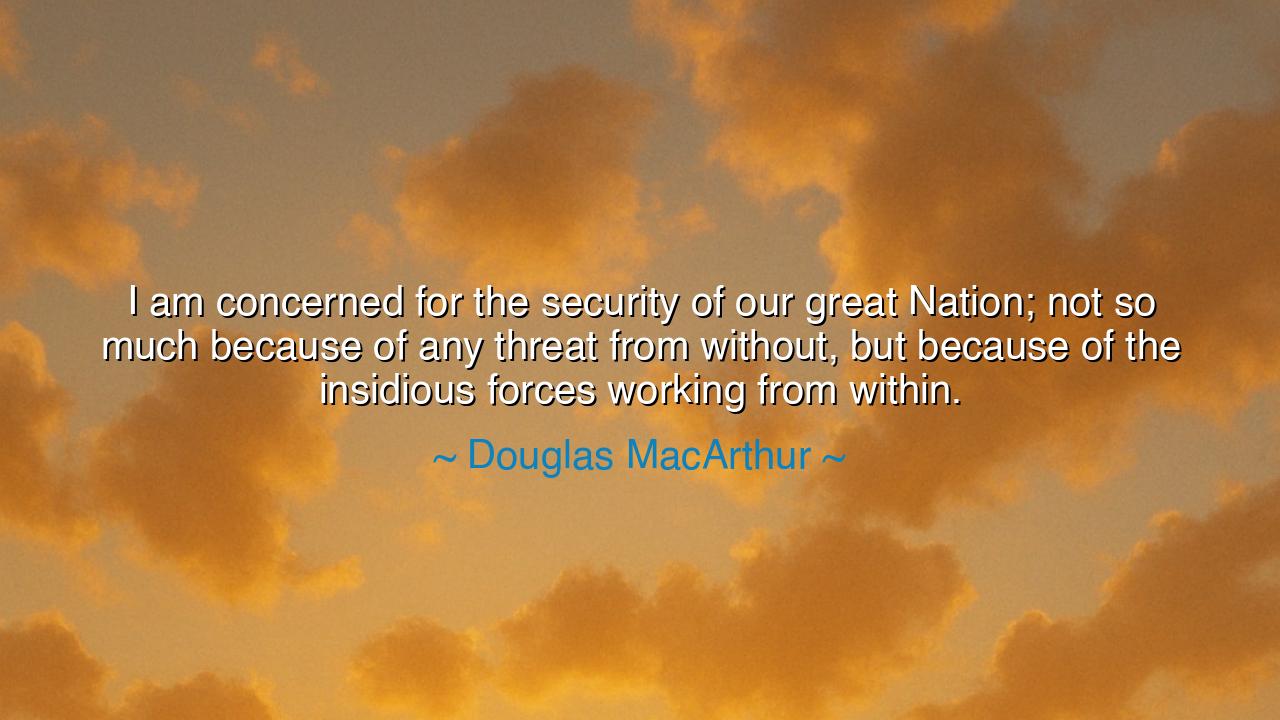
I am concerned for the security of our great Nation; not so much
I am concerned for the security of our great Nation; not so much because of any threat from without, but because of the insidious forces working from within.






The words “I am concerned for the security of our great Nation; not so much because of any threat from without, but because of the insidious forces working from within” were spoken by General Douglas MacArthur, a man whose life spanned the glory and grief of empires. These words, grave and prophetic, were not spoken in the heat of battle, but in the cool reflection of a soldier who had seen the tides of history turn. They carry the wisdom of one who understood that the greatest dangers to a nation are not always the armies that march upon its borders, but the corruption, division, and moral decay that eat away at its soul from within.
In the days of the ancients, the wise often said that no fortress is so mighty that it cannot fall to rot. A wall may stand tall, but if its foundation crumbles, it collapses beneath its own weight. MacArthur, a man of war, learned this truth through peace. He saw that external enemies—the soldiers, the weapons, the banners of foreign powers—are visible and can be met with equal force. But internal enemies—apathy, greed, disunity, and the abandonment of virtue—are invisible and far more dangerous. For when the heart of a people grows weak, even the strongest sword cannot defend them.
The Roman Empire, once the mightiest civilization on earth, did not fall because its enemies were stronger, but because it had forgotten itself. The legions that once conquered the world grew lazy in luxury; the citizens, once proud of duty, became drunk on comfort. Corruption spread through the Senate, and the people began to worship pleasure instead of principle. When the barbarians finally came, they merely struck the final blow — the true defeat had already come from within. MacArthur’s warning echoes this same ancient tragedy: when a nation loses its moral compass, its fall is not a question of if, but when.
MacArthur’s own time bore witness to similar shadows. He lived through the world wars, the rise of fascism, the dread of communism, and the birth of the atomic age. Yet even after defeating enemies abroad, he saw complacency, political corruption, and spiritual decline creeping across his homeland. The general, whose sword had defended his country from foreign threats, feared that victory on the battlefield meant little if the people lost the courage, discipline, and unity that made them strong in the first place. “Insidious forces,” he said — and by this he meant the quiet poisons of pride, ignorance, and division — forces that grow when a nation turns against its own virtues.
The ancients would have called this hubris, the fatal arrogance that blinds men and nations alike. When a people grow too proud to correct themselves, too divided to stand together, too distracted to care, they invite their own undoing. The philosopher Plato warned that democracy itself could crumble when freedom is abused — when citizens no longer see liberty as a responsibility, but as a license to do whatever pleases them. MacArthur’s words are a mirror of that warning, a plea across the centuries that greatness must be guarded not only by armies, but by the conscience of the people.
Consider the story of Athens, the cradle of democracy. She shone like a beacon of wisdom and power, but her light dimmed when her people lost discipline and unity. They turned their debates into quarrels, their ideals into weapons, their citizens into factions. When Sparta’s armies came, the city that once ruled the seas could not even rule itself. Thus Athens fell — not to Spartan spears, but to her own internal discord. MacArthur, a modern warrior, spoke from the same eternal truth that the ancients knew: the greatest battle is always within.
And so, let us heed his warning. The security of a nation does not rest in its weapons, but in the virtue of its people. If greed governs its leaders, if lies poison its discourse, if citizens cease to care for truth or justice, then even the grandest flag will one day fall. The defense of a nation begins not at its borders, but in its classrooms, its homes, and its hearts. Every man and woman must become a guardian of integrity — for freedom, once taken for granted, slips quietly away.
Therefore, the lesson is this: be ever watchful, not only against the enemies that face you, but against the ones that whisper within. Guard your mind from apathy, your tongue from deceit, and your heart from hatred. Teach your children not only how to succeed, but how to stand for what is right. For as MacArthur knew, the fate of nations is not written by the hands of generals or kings — it is written in the character of its people. A nation that forgets its soul is already conquered, no matter how high its walls or how strong its armies. And a people who remember this truth will never fall, for they carry within them the greatest defense of all: the strength of honor.






AAdministratorAdministrator
Welcome, honored guests. Please leave a comment, we will respond soon